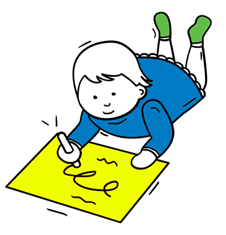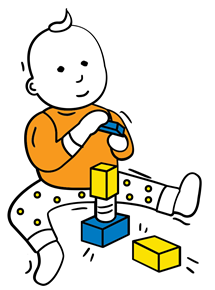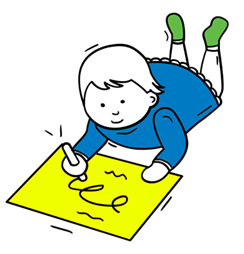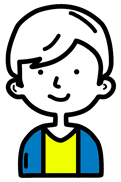Between the ages of two to five years old there will be lots of changes as your child moves away from babyhood to being able to manage a lot more on their own. Your child may be spending a lot more of their time with other people, going to preschool and nursery. This is a big change for young children.
the ages of two to five years old there will be lots of changes as your child moves away from babyhood to being able to manage a lot more on their own. Your child may be spending a lot more of their time with other people, going to preschool and nursery. This is a big change for young children.
There are new skills to learn like potty training and speech and language. These new skills will be learnt through play.
Enjoy this special time together - remember you are your child’s first teacher!
Supporting Development
Give your child the opportunity to make choices – this helps them to feel in control. Simple questions like “would you like your red shorts or your blue shorts?” can help prevent a battle over getting dressed in the morning.
your child the opportunity to make choices – this helps them to feel in control. Simple questions like “would you like your red shorts or your blue shorts?” can help prevent a battle over getting dressed in the morning.
Keep it simple - your little one will struggle if given too much choice. Stick to two or three things that are achievable for both of you.
Routines and boundaries help your child to feel safe and secure because they know how their day will be. You may find they don’t want to do what you ask, but stick to your guns! Stay calm and kind. Your growing toddler needs to know that you’re in control. They learn from you, so try doing the same things at the same time as much as you can.
Once you have your routines in place, it’s okay to be flexible. Holidays are a break for everybody, but you can return to your routine once things are back to normal.
Too many rules will be hard to manage for you and your child - pick what is important to your family.
Young children have lots of energy. They love to go outside and keep active - visit the park or walk in the woods. Opportunities to meet with other children mean that they learn from each other.
Quiet times with family are important too. Reading and sharing quiet times helps your child know that they are important to you. This helps them build their self-esteem as well as their attention span which will give them a head start when they begin school.
Your two year old seems to be growing up fast. At times they will struggle with this as there are still many things they can’t manage by themselves. They can have very strong feelings about what they will and won’t do which can be hard for you to understand at times.
two year old seems to be growing up fast. At times they will struggle with this as there are still many things they can’t manage by themselves. They can have very strong feelings about what they will and won’t do which can be hard for you to understand at times.
Help your child develop skills to manage tasks they would like to do by providing play opportunities to practice these.
Activities could include:
Developing these skills can support your child's emotions by helping them to feel less frustrated, building confidence and boosting their self esteem.
3 Years Old
B y three years old children often move into a period of new skills and understanding. This helps build strong relationships with those around them. Your child will still need to know that they can return to you as their safe place but will enjoy playing with other children rather than just alongside them.
y three years old children often move into a period of new skills and understanding. This helps build strong relationships with those around them. Your child will still need to know that they can return to you as their safe place but will enjoy playing with other children rather than just alongside them.
You can support their developing relationships by providing chances to play with other children and practice how to manage different situations in a safe way.
You can do this by having role play activities available such as:
These do not need to be expensive toys but imaginative play with household objects will work. Children love using packaging and cardboard boxes as cars or airplanes for example!
The important thing is for your child to spend time with others around their own age. This give children the chance to 'act out' situations and to practice how to manage when things don't go quite as they had expected, with your support as needed. They will also learn these skills by copying people around them.
4 - 5 Years Old
Between the ages of four and five your little one is preparing for school. You can really help your child feel ready by encouraging them to learn skills like getting dressed, putting shoes on, brushing their teeth and eating meals at a table.
the ages of four and five your little one is preparing for school. You can really help your child feel ready by encouraging them to learn skills like getting dressed, putting shoes on, brushing their teeth and eating meals at a table.
This can be a tricky time as your child may refuse your help as they want to do things by themselves! They are building a sense of independence and it may be helpful to try to plan times when you can support your child to practice these skills without feeling under pressure.
For example:
These skills will help them feel prepared and confident that they will be able to manage at school. They will also support your child's developing emotional health by building confidence and self esteem, reducing any anxieties they may have.
You can contact the Healthy Child Programme by calling Just One Number on 0300 300 0123 or texting Parentline on 07520 631590. Our opening hours are 8am-6pm Monday-Friday (excluding bank holidays) and 9am-1pm on Saturdays.
If you are 11-19 you can text ChatHealth on 07480 635060 for confidential advice from one of our team.
For 11–25 year olds Kooth is a free, confidential and safe way to receive online counselling, advice and emotional well-being support.
Childline - Children and young people under 19 can call 0800 1111 for free support.
Young Minds Parents Helpline - Call 0808 802 5544 for free Mon-Fri from 9.30am to 4pm.
To speak to other Norfolk parents and carers, you can join our online community forum below.